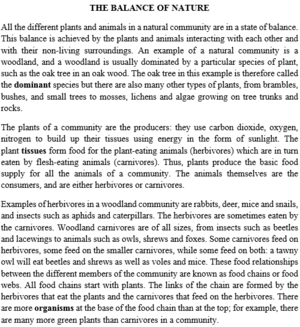Read the following passage and mark the letter A, B, C or D to indicate the correct answer to each of the questions from 43 to 50.
The technology of the North American colonies did not differ strikingly from that of Europe, but in one respect, the colonists enjoyed a great advantage. Especially by comparison with Britain, Americans had a wonderfully plentiful supply of wood.
The first colonists did not, as many people imagine, find an entire continent covered by a climax forest. Even along the Atlantic seaboard, the forest was broken at many points. Nevertheless, all sorts of fine trees abounded, and through the early colonial period, those who pushed westward encountered new forests. By the end of the colonial era, the price of wood had risen slightly in eastern cities, but wood was still extremely abundant.
The availability of wood brought advantages that have seldom been appreciated. Wood was a foundation of the economy. Houses and all manner of buildings were made of wood to a degree unknown in Britain. Secondly, wood was used as fuel for heating and cooking. Thirdly, it was used as the source of important industrial compounds, such as potash, an industrial alkali; charcoal, a component of gunpowder; and tannic acid, used for tanning leather.
The supply of wood conferred advantages but had some negative aspects as well. Iron at that time was produced by heating iron ore with charcoal. Because Britain was so stripped of trees, she was unable to exploit her rich iron mines. But the American colonies had both iron ore and wood; iron production was encouraged and became successful. However, when Britain developed coke smelting, the Colonies did not follow suit because they had plenty of wood and besides, charcoal iron was stronger than coke iron. Coke smelting led to technologic innovations and was linked to the emergence of the Industrial Revolution. In the early nineteenth century, the former colonies lagged behind Britain in industrial development because their supply of wood led them to cling to charcoal iron.
Question 47: According to the passage, by the end of the colonial period, the price of wood in Eastern cities ________.
A. rose quickly because wood was becoming so scarce.
B. was much higher than it was in Britain.
C. was slightly higher than in previous years.
D. decreased rapidly because of lower demand for wood.




Đáp án C
Dịch nghĩa: Theo bài viết, ở cuối thời kì thuộc địa, giá gỗ ở những thành phố phía Đông _______.
A. tăng nhanh vì gỗ trở nên khan hiếm
B. cao hơn nhiều so với giá ở Anh
C. cao hơn một chút so với nhiều năm trước
D. giảm nhanh vì nhu cầu gỗ giảm ,
Giải thích: Thông tin nằm ở đoạn 2 “By the end of the colonial era, the price of wood had risen slightly in eastern cities”